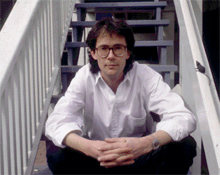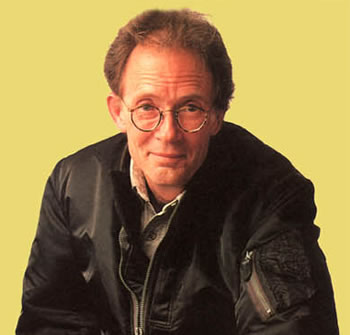William Gibson
 American author, mostly of science fiction novels - called the father of the cyberpunk movement, a subgenre of science fiction - coined the term "cyberspace."
American author, mostly of science fiction novels - called the father of the cyberpunk movement, a subgenre of science fiction - coined the term "cyberspace."
His first and most influential novel, Neuromancer, has sold more than 7 million copies worldwide since its publication in 1984.
Gibson blogs and often includes excerpts from his work there.
QUOTES:
"I suspect I have spent just about exactly as much time actually writing as the average person my age has spent watching television, and that, as much as anything, may be the real secret here."
"Emergent technology is, by its very nature, out of control, and leads to unpredictable outcomes."
"...I felt that I was trying to describe an unthinkable present and I actually feel that science fiction's best use today is the exploration of contemporary reality rather than any attempt to predict where we are going... The best thing you can do with science today is use it to explore the present. Earth is the alien planet now." --from an interview on CNNfn, August 26, 1997.
from Burning Chrome "...the street finds its own uses for things."
From his Wikipedia entry:
 In Neuromancer, Gibson first used the term 'matrix' to refer to the visualized Internet, two years after the nascent Internet was formed in the early 1980s from the computer networks of the 1970s. In this conception of the "matrix", he predicted a worldwide communications network eleven years before the origin of the World Wide Web, although related notions had been described elsewhere.
In Neuromancer, Gibson first used the term 'matrix' to refer to the visualized Internet, two years after the nascent Internet was formed in the early 1980s from the computer networks of the 1970s. In this conception of the "matrix", he predicted a worldwide communications network eleven years before the origin of the World Wide Web, although related notions had been described elsewhere.
At the time of writing Burning Chrome, Gibson "had a hunch that [the Internet] would change things, in the same way that the ubiquity of the automobile changed things." In 1995, he identified the advent, evolution and growth of the Internet as "one of the most fascinating and unprecedented human achievements of the century", a new kind of civilization that is in terms of significance on a par with the birth of cities, and in 2000 predicted it would lead to the death of the nation state.
Observers contend that Gibson's influence on the development of the Web reached beyond prediction; he is widely credited with creating an iconography for the information age, long before the embrace of the Internet by the mainstream. In writing the Sprawl trilogy, Larry McCaffery claims that Gibson laid the "conceptual foundations for the explosive real-world growth of virtual environments in videogames and the Web".
In his afterword to the 2000 re-issue of Neuromancer, fellow author Jack Womack suggests that Gibson's vision of cyberspace may have inspired the way in which the Internet (and the Web particularly) developed, following the publication of Neuromancer in 1984, asking "what if the act of writing it down, in fact, brought it about?"
Novels
Sprawl trilogy: Neuromancer (1984) Count Zero (1986) Mona Lisa Overdrive (1988)
The Difference Engine (1990; with Bruce Sterling)
Bridge trilogy: Virtual Light (1993) Idoru (1996) All Tomorrow's Parties (1999)
Pattern Recognition (2003)
Spook Country (2007)
Comments
No comments